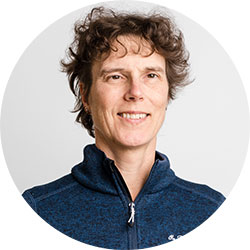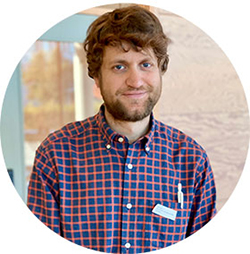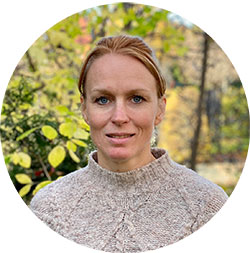On a sunny October day, One Health Day was held for the second year, across all SLU campuses connected via video link between the locations. The programme attracted over 80 participants and offered a broad range of topics, from biodiversity, environmental pollution, comparative medicine, and infectious diseases to climate change – and how these affect our collective health. The day aimed to provide an overview of ongoing research by presenting a selection of research related to the One Health concept. During the breaks, participants had the opportunity to interact with each other and establish new contacts for future projects. The invited speakers came from SLU, Uppsala University, Umeå University, and Lund University.
One Health – One World
One Health is an interdisciplinary approach that provides a holistic view of health and is an important research area where SLU’s research and expertise contribute new and significant knowledge, both nationally and globally. One Health addresses health-related issues at the interface between animals, humans, and ecosystems.
Today, we face many crucial health-related issues, both for humans, animals, and our ecosystems, such as the increased spread of infectious diseases and antibiotic resistance, loss of biodiversity, and climate change. To solve the complex challenges we face, collaboration between researchers from different disciplines is required. SLU contributes important knowledge in several areas, such as veterinary medicine, agronomy, economics, biology, ecology, water, forestry, and social sciences.

"Our goal with organising a full day on One Health is to highlight the impressive range of research at SLU that links to the One Health concept. Almost all research at SLU touches on health in some way", says Susanna Sternberg Lewerin, programme director for the SLU Future One Health platform.
"We want more of our researchers to feel involved in the concept and hopefully be inspired by each other’s research and perhaps become curious about this interdisciplinary approach to health", she continues.
Some reflections from participants
We took the opportunity to ask three questions to two of the participants during a break: Oliver Moore, a postdoctoral researcher at the Department of Forest Mycology and Plant Pathology and Linley Chiwona Karltun, a researcher at the Department of Urban and Rural Development.

How does your research relate to the One Health concept?
"I work very much in the ‘Environment’ and ‘Plants’ sector of the One Health concept", says Oliver. In my current postdoctoral work, I research how land management practices (crop rotation types and fertilisation levels) influence the fate of nitrate fertilisers in contrasting sites across Sweden. The broader goal is to increase nitrogen use efficiency for improved crop yields, reduce nitrogen runoff into the environment and reduce nitrous oxide emissions – which have serious implications for the wider environment. My PhD research was on arsenic mobilisation in groundwater, which has a serious impact on human health".

"My research focuses on the intersection of food systems, health, and poverty reduction, primarily involving rural women in food-insecure communities", says Linley Chiwona Karltun. The evolving definition of food security, going beyond the original pillars of availability, access, utilisation and stability, requires that I as a scientist also consider issues of agency and sustainability. This aligns well with the One Health concept. I am currently part of an international group that discusses cassava safety and processing issues. Climate variability in the Democratic Republic of Congo (DRC) is increasing cyanide levels in water downstream from cassava-soaking ponds, a common processing method. In Malawi, prolonged droughts force communities to eat bitter roots, which require extensive boiling and water changes to be safe. The One Health approach highlights the importance of understanding food processing and cultural food preferences".
Any highlights from the day?
"As someone with a background in environmental geochemistry, I was very interested in the work on mercury cycling in aquatic environments and how this varies between geographical areas (e.g. Sweden has low Hg concentrations in water and high concentrations in fish, but the opposite is true in China). I was also very interested in the effects of cadmium contamination on crops in southern Sweden", says Oliver.
"I thoroughly enjoyed the coffee break and lunch interactions – I met some new SLU researchers that I connected with. I also had a Aha-moment from Kevin Bishop's presentation on mercury, forests and the connection with water and fish. Why is there more mercury in Swedish fish than in fish from Ethiopian lakes? We do not know why!? The bigger the fish, the more mercury – like tuna. Hmmm! I thought I was OK with tuna.. All to be consumed in moderation, I suppose", says Linley.
Did you gain any new insights that you did not know or think about before?
"In general, I think it was very interesting to hear how all these topics relate to each other. As researchers, we often get buried in our specific research topics and lose sight of the "big picture", says Oliver.
"Actually, that is why I came to the meeting. To listen to Frauke Ecke talk about rewilding versus restoring forest ecosystems. Her take-home message: biodiversity loss increases the risk of disease. There are so-called forests – mostly just pine monocultures driven by commercial interests. It reminded me of our research on market-driven afforestation in Ethiopia", says Linley. Very interesting!
To conclude..

"It’s great to see so many colleagues from different parts of SLU here, talking and exchanging experiences", says Elisabeth Rajala, a researcher at the Department of Animal Science and coordinator for SLU Future One Health. She continues:
"I believe there is an increased awareness of One Health now compared to just a few years ago. Perhaps it is a pandemic effect? Covid-19 really put One Health on the agenda – that everything is interconnected – animals, humans, and our environment".




